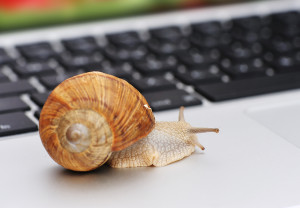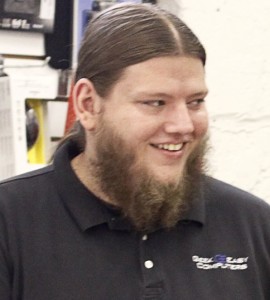A common problem people experience with their computers is that they just aren’t fast enough. Maybe it was a speed demon 18 months ago, but now it’s just floundering or crawling and you’d like to know why and what to do about it. There are quite a few reasons why a computer could slow down, some deal with the physical condition of the computer and others with the software. Either way, here are the most common causes of computer slowness and what can be done about them.

Mac or PC
- Overheating – This is one we see very regularly and particularly on Mac laptops, but it is a universal problem. Computers overheat for a few reasons. Without being too technical, the cooling system in a computer transfers heat from the processor (CPU) to a heatsink using thermal paste. The heatsink is a piece of metal with fins on it that air can easily blow across to dissipate the heat. After time the thermal paste dries up and does not transfer heat away from the processor or debris like pet hair can clog up the heatsink’s fins making it unable to cool. We call this fix a heatsink service, and we replace the thermal paste and clear any dust and debris from inside the computer to allow it to cool normally. Fans themselves can also fail and cause heat issues, so we recommend replacing them when fans stop spinning the way they should. For more information on overheating, see our blog post: Beating the Heat!
- Failing Hard Drive – The hard drive stores all of the data on the computer, and when they fail unexpected things can happen. Sometimes the computer will fail to boot at all, but in the early stages of failure, it can take longer to access the data which can result in slow computer startups, slowness starting programs and slowness accessing files. When our tests find a failing hard drive, we recommend backing up the data and replacing the drive.
- Bad RAM – The computer memory (RAM) can develop errors over time. The computer needs to copy data from the hard drive (permanent storage) into RAM before it can launch programs, open files, etc. which includes the operating system. Computers have gotten better at dealing with the occasional piece of bad data, so it might be hard to spot a memory problem when you’re having one. What happens with bad RAM is the computer is not getting the data it expects, so it may need to try multiple times to launch a program or open a file before it’s successful. Through extended testing, when we determine RAM is bad, we will recommend replacement. For more information on RAM, see our blog post: Q & A: What Does RAM (Memory) Really Do?
- Hard Drive Full – Many people are unaware of this one, but it definitely happens when hard drives fill up. All computers regularly use temporary storage space on the hard drive for a number of processes that happen behind the scenes. When a hard drive is filled up with movies, music, pictures and programs to the point where there’s no free space, the computer struggles constantly to remove and reuse the temporary storage. As the amount of free space shrinks, the computer has a harder and harder time until it’s not able to start up the operating system or continue working the way it should. We recommend upgrading to a larger drive or clearing off unneeded files in these cases.
- Software Upgrades – In the last few years we have also seen more and more slowness caused by upgrading the operating system. New versions of Mac OS and Windows are built for newer, faster computers, and older or cheaper computers may not have the RAM or processing power to handle them as well. In situations like this, memory upgrades to 4GB or more are recommended if the processor is fast enough for it to make a difference. For a look at the newest operating systems, see our blog posts: El Capitán del Capitán and Windows 10: A Personal Look (coming soon).
PC
- Viruses\Spyware – These apply to Macs in certain situations and more and more over the last year, but they are primarily a Windows problem. So far, Mac viruses have still been easier to remove and less devastating than their PC counterparts. Either way, having unwanted software running on the computer behind the scenes can cause serious slowness. Viruses can also take up even more system resources doing malicious activities like participating in a botnet (collection of compromised computers used for things like cyber attacks) or encrypting all of your files in order to ransom them back to you. In cases like this, virus removal and top-rated virus protection are our recommendations. You can also find more tips in our blog post: How to Avoid Malicious Software!
Mac
- Hard Drive Cable – This is a relatively odd situation, but for whatever reason the hard drive cables in Mac laptops regularly go bad. The computer will start showing the same symptoms as a bad hard drive, but the drive will pass all of our tests. It can cause the computer not to start or slowness starting up, launching apps, etc. We keep a regular stock of the most common drive cables because this is such a frequently needed repair. These also occasionally fail on PCs, but for every one of those, we probably see 10-12 Macs with the problem. The fix is relatively simple and just involves replacing the cable.
There are a few other possible causes, but these are the ones we see most frequently. The way the computer’s hardware and software work together makes slowness a relatively complex issue that needs a first-hand look to resolve. We start by testing the physical causes to rule those out and then look at other factors to find the source of the slowness and recommend a fix.
If you have questions about your computer’s slowness or are looking into upgrade options, we are always here to help. Feel free to share your slowness woes with us on Facebook, Twitter and in the comments below.
Geek Easy Computers – Making Technology Easier
 |
Nate Welling has been a technology hobbyist his entire life, spending summer vacations in his youth figuratively glued to computer screens.
He has worked in computer services professionally for what seems like forever.
He has more computing devices than anyone still able to speak and communicate effectively has any reason to use. |